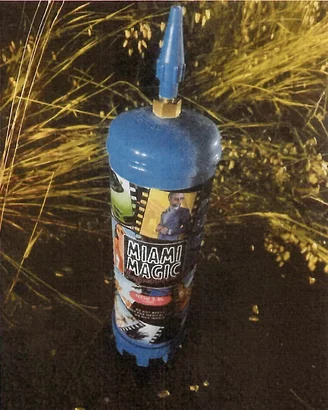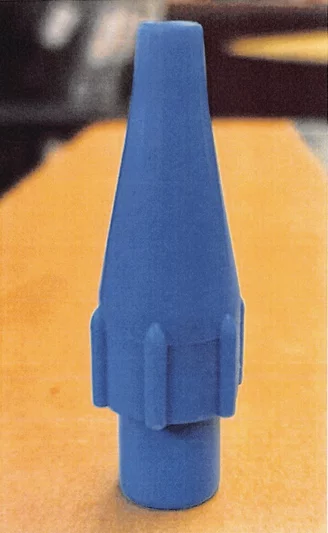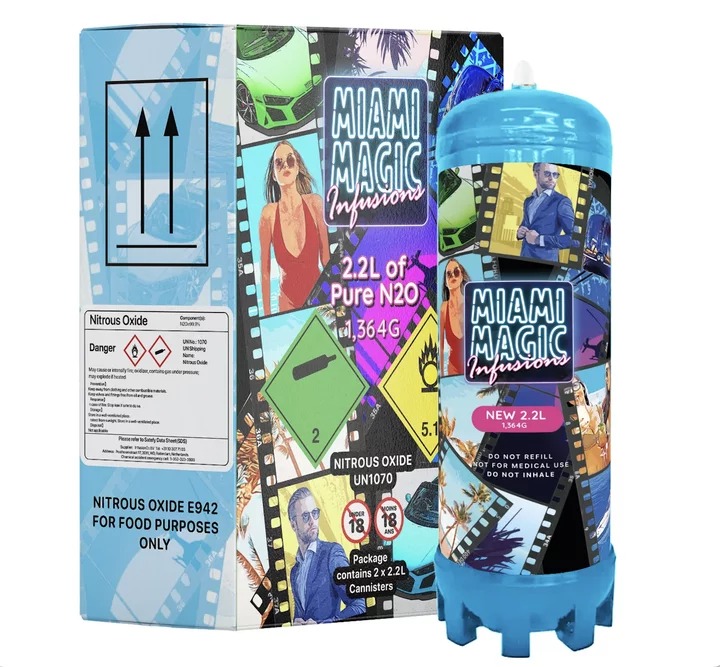A Eureka driver fatally struck a pedestrian and caused serious injuries last year as she drove through the city while high on nitrous oxide. | File photo by Andrew Goff.
###
NOTE: This story was updated on Sept. 15, 2025, to include comment and input from attorneys representing Commerce Enterprises, Inc., (Commerce), clarifying that the allegations are stated in a legal complaint, in declarations and within depositions that have yet to be adjudicated, have not been proven, and the truth of which Commerce contests.
###
On the sunny afternoon of May 22, 2024, a 30-year-old Eureka woman named Maria Cuevas pulled her car out of the McDonald’s at the south end of town and took a hit of nitrous oxide, as she would describe almost a year later in a deposition she provided while in custody at the Humboldt County Correctional Facility.
In her deposition transcript, Cuevas states that, as she drove through Eureka, heading east on Harris and then south on I Street toward the sober living house where she was staying, she took another hit. In her deposition, Cuevas states that she was inhaling from a 2.2-liter canister of nitrous, labeled “Miami Magic.” She took another hit. And another.
Nitrous oxide has culinary, medical and industrial uses, but recreational use has increased dramatically in recent years. Canisters of varying sizes — often called “whippits” — can be purchased at corner stores, smoke shops and sex shops. Inhaling the colorless, slightly sweet gas creates a brief, euphoric high, and the chemical compound metabolizes rapidly in the blood, making it hard to detect in urine drug tests.
Huffing nitrous, aka “laughing gas,” can also make users dizzy and disoriented, lose motor control, hallucinate and lose consciousness.
According to Cuevas’s deposition transcript, as her car approached the intersection of I and Ninth streets, she slowed for a pedestrian, 66-year-old David Sprague. But then, for unknown reasons, she accelerated, slamming her car into his body and sending him airborne. Bystanders and emergency responders tried to help, but Sprague later died at the scene.
Cuevas fled, smashing into several parked cars and causing a multi-vehicle collision at the intersection of Seventh and I, seriously injuring another person, before finally crashing into a building. She’d left a trail of destruction in her wake.
In March, Cuevas pleaded guilty to charges including felony hit and run and gross vehicular manslaughter. She was sentenced to 25 years and four months in prison.
###
But for the family of David Sprague, the pedestrian whose life ended so violently that afternoon, there’s more accountability to be doled out. His widow and daughters feel that Cuevas isn’t the only one to blame for what happened, and in a civil complaint now making its way through Humboldt County Superior Court, they’re going after the corporations that created, imported and distributed the nitrous oxide product Cuevas inhaled that day, as well as the McKinleyville smoke shop that sold it to her.
The plaintiff is Jessica Sprague, David’s daughter and the administrator of his estate. She’s suing on behalf of herself, her sister Natosha Sprague and their mom (David’s widow), Shari Sprague. Jessica declined to comment for this story via her attorney, William Stein of Eureka firm Janssen Malloy.
Cuevas is also named as a defendant in the civil complaint, which accuses her of negligence for operating her vehicle while high.
“As a proximate result of CUEVAS’ negligence, DAVID suffered pain, suffering, and disfigurement before his death,” the complaint says while noting that this loss has deprived his family of the “love, companionship, comfort, care, assistance, protection, affection, society moral support, guidance and training” that David would otherwise have provided.
But unlike the criminal case, which focused exclusively on Cuevas, the civil complaint goes on to allege that when she killed David Sprague with her car, she had inhaled a product that had been deliberately manufactured, marketed, distributed and sold to get people high. Nobody anywhere along that supply chain was under the illusion that consumers would use this nitrous to make whipped cream, aerate their hollandaise sauce or fancy up their cocktails. The companies are therefore complicit in Sprague’s death, the complaint argues, and should be held accountable.
There is some legal precedent for such cases. In 2023, for example, a Missouri jury awarded $745 million in damages to the parents of a 25-year-old woman killed by a driver who’d inhaled nitrous. United Brands (manufacturer of Whip-It!-brand nitrous chargers) was ordered to pay 70 percent of the damages while a local head shop was held 20 percent liable and the driver who inhaled the gas was held 10 percent liable, according to the Associated Press. Similar lawsuits have since been filed elsewhere.
Jessica Sprague’s complaint, first reported by John Chiv, alleges that just five days before Cuevas’s deadly May 22 rampage through Eureka, she’d had a similar incident, blacking out after inhaling nitrous behind the wheel and crashing her car on Hwy. 101 near McKinleyville. (Cuevas later acknowledged this in a sworn declaration.) In deposition transcripts, Cuevas and Quincy McBride (who states he purchased a canister of Miami Magic at a McKinleyville smoke shop and gave it to Cuevas) state that CHP officers found a whippit canister in her car. Cuevas states in her deposition transcript that it was this same canister of Miami Magic Infusions McBride gave to her that she was inhaling from five days later.
This photo of a 2.2-liter canister of Miami Magic Infusions is included in Sprague’s complaint.
###
In a declaration submitted to the court last month, Stein, Sprague’s attorney, lays out the interviews and investigative work he did to track down each step in the supply chain. A friend of Cuevas’s admitted that he provided her with a Miami Magic canister he’d purchased from Payless Cigarette Smoke Shop at 2720 Central Avenue in McKinleyville.

McBride alleges in his deposition that this photo was taken by a California Highway Patrol officer. He also alleges that it depicts the canister of nitrous oxide he provided to Cuevas before her May 17, 2024, crash in McKinleyville. This photo was taken on May 17. Commerce alleges that a Miami Magic cartridge was not recovered from the scene of the May 22 incident.
That store’s owners, Shoaib Khushiwal and Ahmad Arghandiwal, operate a wholesale business that purchases Miami Magic and other nitrous products from a wholesaler called PrimeCo — or it did before Humboldt County banned sales of nitrous oxide for recreational use this past June, anyway.
Here’s the rest of the supply chain, according to the complaint:
PrimeCo buys nitrous products from Commerce Enterprises, Inc., a Florida-based importer that owns warehouses and operates a distribution network here in California. A related Australian corporation called Commerce Enterprises Pty. Ltd., which does business as Quick Whip, pays factories in China to create nitrous oxide products to its specifications, which it then labels and sells under its own brand names.
In a letter to the editor, attorneys for Commerce dispute these allegations, saying the company uses independent third-party logistics providers and does not own or operate California based warehouses. The attorneys also say that the Australian entity is a brand owner only and does not place or pay for U.S.-bound manufacturing orders. Its U.S. operations are handled by Commerce Enterprises, Inc. (USA), a separate, independent company.
The complaint argues alleges that the brand names — and the design of the nitrous canisters — give the game away, revealing the anticipated use of these products.
For example, the complaint alleges that, while some nitrous canisters in the Commerce stable of products feature culinary-sounding names like QuickWhip and FreshWhip, others are marketed with nudge-wink branding such as Baking Bad Infusions (with packaging that mimics the AMC TV series about a meth-cooking high school chemistry teacher) and Miami Magic Infusions, which, as the complaint notes, is marketed with neon cartoon images depicting “a Miami party lifestyle … [that evokes] the video game Grand Theft Auto: Vice City.”
The complaint notes the similarity of Miami Magic’s marketing to a particular video game, noting “its eye-catching color and the presence of sports cars, bikini girls, and suave sport-jacketed men, all of which have nothing to do with the stated culinary purpose of the product.”
###
The complaint alleges that, while Commerce describes inhaling nitrous as a misuse of its products, it packages those products in big 2.2- and 3.3-liter canisters, a size that’s “excessive for culinary use, but perfect for those inhaling the product,” per the complaint. and further alleges that Commerce sells those canisters exclusively to smoke shops and head shops, making no effort to distribute them to culinary supply stores or commercial kitchens. the complaint says. Commerce also disputed this allegation via its attorneys, who say Commerce-related brands are, in fact, distributed to culinary and hospitality channels with age-verification and misuse controls.

This photo of a nozzle from a canister of Miami Magic was included in an interrogatory (list of questions) sent by the plaintiff to Commerce Enterprises, Inc.
The complaint also alleges that the nozzle atop Miami Magic Infusions tanks cannot be connected to an infuser or whipped cream dispenser, though it can easily be used to fill balloons or expel nitrous “directly into a recreational user’s mouth.” Commerce’s attorneys state that the company’s large cylinders are used with a pressure regulator and food-use adapter hose to connect to a dispenser/infuser. “The factory-supplied tip is a purge/vent nozzle intended to safely empty residual gas prior to disposal, not the normal culinary dispensing method,” the attorneys wrote in their letter to the editor.
In short, the complaint alleges that Commerce Enterprises, Inc., and its Australian counterpart “knowingly sell the vast bulk of their nitrous oxide at smoke shops, head shops, and vape shops [which] do not sell food or culinary products. Instead, they sell [other] products that help people get high, such as pipes, bongs, and vaporizers, and mind-altering substances such as kratom, amyl nitrates, and nicotine products.”
The complaint seeks unspecified damages against Commerce Enterprises, PrimeCo Wholesale, Aryana Wholesale, Payless Cigarette Smoke Shop and that store’s owners for:
- negligence (knowingly producing, distributing and selling a product people use to get high);
- products liability (for supplying a “defective” and unsafe product); and
- conspiracy (for profiting from a “common plan” to dispense nitrous, knowing thatpurchasers would inhale it).
###
In their answers to the complaint, the defendants all deny liability and offer long lists of legal defenses. They insist that Cuevas misused the nitrous oxide product and is responsible for her own actions — or, alternatively, that the blame rightly belongs with the other defendants.
The attorney representing Commerce Enterprises, for example, argues that any injury, damage or death “was caused by the action or conduct of others” rather than her client. She also argues Cuevas was a sophisticated and knowledgable person who “knew or should have known the product was dangerous.”
Commerce’s attorney goes on to argue that if the court does decide to award any damages, her client shouldn’t be on the hook for the whole amount; rather Commerce should “be required to pay only for its proportionate share of fault, if any … .”
Similarly, the attorney representing Payless Cigarette Smoke Shop and its owners argues that “all injuries and damages” mentioned in the complaint were not their fault but rather “were the result of the conduct of Plaintiff or other defendants or other parties … .”
Each of the defense attorneys have filed cross-complaints for indemnity against the other defendants, which is a “pretty standard” move, according to Stein, who explained via email, “It allows defendants to make arguments that other defendants should get a larger share of the responsibility in the case (which then reduces their share).”
Stein also said he’s grateful that the Humboldt County Board of Supervisors recently voted to ban the sale of nitrous oxide for recreational use, describing it as “a very positive step for public safety in Humboldt.” But since the ban was enacted after the fatal collision, it’s unlikely to have any impact on this case, he said.
Following David Sprague’s death, local city managers met with county public health staff to work toward passing bans across the county. The cities of Arcata and Rio Dell have since banned sales of nitrous oxide for recreational use. Eureka City Manager Miles Slattery tells the Outpost that a tobacco ordinance and nitrous ban will likely come before the city council next month while Trinidad and Fortuna are working on similar ordinances.
There will be a motions hearing in the Sprague complaint tomorrow at 10:30 a.m. in courtroom four of the Humboldt County Courthouse.




CLICK TO MANAGE